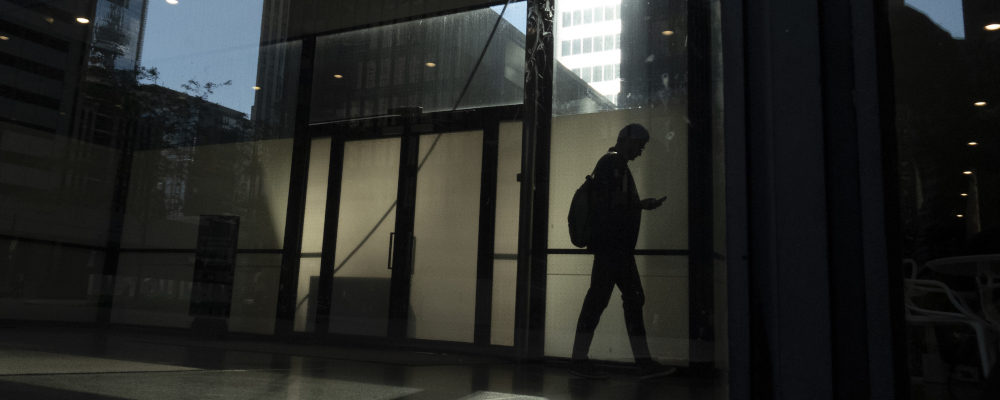If you would like to tell us about your own empty office experience or contribute to this discussion, please email us at [email protected] or contact us anonymously via our online submission form.
The long-standing emptying of places of worship in countries like Canada is well known. The secular trend of Canadians withdrawing from formal religious participation has left aging and half-empty cathedrals in cities and towns scattered across the country. They now stand as physical monuments to a bygone era.
A more recent and less explored development is Canadians’ withdrawal from the secular cathedral: the modern office. Readers will know that the pandemic necessitated an overnight transition to work-from-home for most professional class jobs back in March 2020. Now more than two-and-a-half years later, a persistent share of the Canadian workforce—something approximating one-in-four workers—remains fully out of the office. Leading Stanford University economist Nicholas Bloom has described this trend as the “largest shock to the labour market in decades.”
He’s not wrong. In fact, if anything, he may be understating the significance of the office’s decline because of what it tells us about a broader set of trends that we’ve come to think about at The Hub as a “withdrawal from work.”
We admit that it represents an imperfect catch-all phrase to describe a range of issues concerning how we think about, carry out, and value work in the post-pandemic era. It covers topics such as the persistence of working from home—particularly in the public service—, the rise of so-called “quiet quitting” whereby workers are limiting their employment efforts to what’s minimally required, and a growing expectation that one’s job must affirm his or her deepest aspirations and values.
Each of these labour market developments requires its own inquiry and analysis. But we’d argue that they’re fundamentally linked. They reflect a new, post-modern conception of work that’s ahistorical, classist, and ultimately unhealthy for individuals and our society as a whole.
It’s important to emphasize here that these trends are mostly concentrated among the professional class who David Brooks masterly defined as the “Bobos”, or bourgeois bohemians. So-called “essential workers” such as grocery clerks, truck drivers, and long-term care workers who helped to sustain us during the pandemic generally don’t have the financial luxury to concern themselves with elite debates about working from home or work/life balance or the new “political capitalism.” They’re instead focused on more mundane concerns like providing for their families’ basic material needs.
The professional class in general, and the Bobos in particular, however, buoyed by significant market returns to education as well as their considerable cultural and political clout, have been able to shift the fruits of white-collar labour further and further down Maslow’s hierarchy of needs. The search for self-actualization is now mostly a luxury good for Canada’s overcredentialized elite.
This growing divide between the “laptop class” and the working class1Sean Speer has a forthcoming paper with the Cardus Institute that sets out a new conceptual and empirical taxonomy of Canada’s working class. The upshot: more than half of working-class Canadians now works in service-sector jobs such as restaurant server or personal support worker. may be one of the biggest political economy consequences of the pandemic experience.
Consider working from home for instance. Early pandemic estimates from Statistics Canada were that about 40 percent of Canadian workers are in jobs that can be carried out from home. But these top-line numbers obscure significant variation based on sector or educational attainment. While 85 percent of those in finance or insurance were able to work from home, less than one in ten workers in accommodations and food services had the same option. As for educational attainment, more than 60 percent of those with a bachelor’s degree or higher could work from home compared to barely 25 percent for those with just a high-school diploma.
The divide is even more pronounced when one accounts for the public and private sector dynamic. Not only has public sector employment significantly grown in relative and absolute terms since the depths of the pandemic, but its workforce also remains disproportionately at home. As of this spring, for instance, Statistics Canada estimates that nearly 50 percent of Ottawa workers were still working from home. This is the highest share of any place in Canada by far. Future reporting for The Hub will further break down these public and private sector differences and their political economy implications.
Notwithstanding some of the benefits of working-from-home, our current business and public policy conversations seem to underestimate its invisible costs to organizational culture, professional development and mentorship for younger workers, and the opportunity costs of ideas and innovations that won’t materialize because meaningful face-to-face interaction has been replaced with deracinated Zoom calls. All things being equal, most workplaces should aim to get back to normal in order to reap the benefits of what economists call “network effects”, or what the British writer Matt Ridley artfully termed “ideas having sex.”
Then there’s quiet quitting, which started as an internet meme and has since become the subject of mainstream attention in the New York Times, the Wall Street Journal, and the Globe and Mail. This is a development that similarly requires more critical scrutiny. A new cultural norm that tells workers to aspire to the bare minimum and disparages going above and beyond could have profound implications for our economy and society.
“Work may be drudgery at times but it’s far better than the alternative.”
It could have serious economic consequences in the form of lower marginal productivity, less innovation, and less output. The timing couldn’t be worse for Canada’s economy. We’re not only stuck in a long-run “two-percent [growth] trap”, but evidence suggests that our post-pandemic recovery is being disproportionately fueled by government spending and public sector hiring. Now is hardly the time to take our foot off the gas of a sputtering economy. We should instead aspire to a richer, more prosperous future.
A message of quiet quitting could also have negative effects on young people starting their careers. It’s a formative time when they’re supposed to be investing in their own future by boosting their human capital, accumulating experiences, building relationships, and cultivating the habits of productive work. These personal investments can pay huge returns in the future—they can quite literally change a person’s career and life trajectory. It’s irresponsible and frankly immoral therefore to tell a generation of young people that coasting and complacency are in its interests.
It’s incompatible with a deeper understanding of work as a key source of meaning, purpose, and identity. As the Cardus Institute has comprehensively documented, there’s a huge body of scholarship on the non-financial benefits of work including socialization and civic engagement, better health, family stability, and life satisfaction.
One way to better understand these positive socioeconomic and psychological benefits of work is to think about the pathologies present in places where there’s a lot of joblessness. The high incidence of family breakdown, criminality, substance abuse, and suicide in deindustrialized communities (what Anne Case and Angus Deacon have famously characterized as the “deaths of despair”) is a powerful expression of the importance of work beyond merely a paycheque. Work may be drudgery at times but it’s far better than the alternative. It’s a sober reminder that our society should celebrate and respect work as a vital institution for human flourishing.

The final consequence is that it risks standing in the way of human progress. Most examples of progress—including breakthrough technologies, new expressions of art, or the advancement of human rights—started with individuals who subscribed to the opposite view of quiet quitting. These were people motivated by a sense of ambition rather than clock checking. Their vision of work was about pushing themselves and applying their skills and talents to produce something beautiful, just, or valuable and perhaps even change the course of history itself. This point cannot be emphasized enough: history is ultimately shaped by strivers, not slackers.
The case for elevating work isn’t limited to the extraordinary cases among us who will do something historic or transformative. Most of us aren’t Steve Jobs or Michael Jordan or Katalin Karikó whose single-minded efforts led to mRNA vaccines. But that doesn’t change our perspective at all.
There’s something honourable and noble in those who take pride in their efforts to do a good job, help those around them, and provide for their families. Our society depends on such people to function. We should recognize and honour them by bringing a similar earnestness and integrity to our own work irrespective of whether we work in a restaurant, a hospital, or an office.
Let us come back to where started with the emptying of cathedrals. Cathedrals in their day were places of community. They were important physical touchstones for a society that sought meaning in common enterprise. Secularization has shifted our sources and search for meaning from the divine to the human. Work remains one of the last “spheres” in our society where we can search out common interests, explore common projects, and advance common interests. Much of the remaining spheres we traditionally used to create meaning in our lives have either withered (the spiritual) or become highly contested to the point of working against community and commonality (politics).
“History is ultimately shaped by strivers, not slackers.”
Work, in an office, on a factory floor, or in a restaurant, is one of the last remaining venues for us to discover our strengths, weaknesses, failures, and success in close, physical interaction with others. If we lose this, we abandon the last bulwark against a culture of narcissism where every decision, every choice, is shaped by the subjective experience of our own interests. We risk falling into a cul-de-sac of self-reaffirming inclinations and desires, devoid of content and stripped of meaning.
We don’t adopt views on religious matters here at The Hub, but it should be relatively non-contentious to recognize that declining religious participation has had significant effects on modern society. We believe that a withdrawal from work could similarly have major consequences for our society that need to be better understood, debated, and ultimately contested.
Readers may note a different tone here. In the sixteen months or so since we first launched, we’ve refrained from publishing official editorials. It’s been our institutional position that in an era of clickbait journalism and political soundbites, The Hub should serve as a neutral platform for people of good faith to come and debate issues concerning governance and public policy and their consequences for Canada’s future.
But this is different. Work is too important for us to stay silent in light of these worrying trends. The evidence is clear: work isn’t just good for people’s paycheques. It may not bring salvation but it’s still good for their souls.




